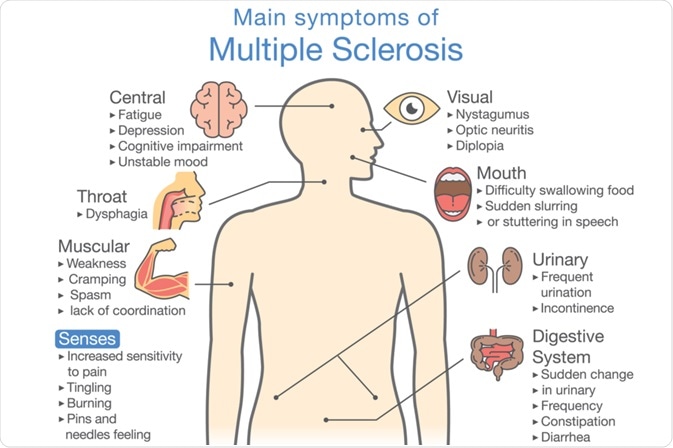Multiple sclerosis (MS) is characterized by a variety of symptoms including impaired vision and numbness. It can be challenging to compile a definitive list of signs to look out for, as the same symptoms can be caused by other disorders. Moreover, MS symptoms greatly vary from one person to another, and early signs can be subjective.
MS symptoms
While symptoms vary from patient to patient, many of the possible early signs of MS are fairly consistent among most MS patients. Below is a list of common and less common signs that are sometimes observed in the early development of MS.
Invisible Symptoms in Multiple Sclerosis (Part 1) | National MS Society
Abnormal sensations
Feelings such as numbness or tingling in some parts of the body, such as the arms and legs, is a very common initial sign of MS.
Fatigue
Fatigue is one of the most common signs of MS and is often described as a feeling of exhaustion, even while carrying out simple day-to-day tasks. Fatigue can significantly affect daily chores and can rapidly progress following physical exercise, exposure to hot temperatures, and when the individual has an infection.
Vision problems
A common vision problem called optic neuritis is regarded as an early sign of MS. This symptom is considered a more “concrete” sign compared to other “vague” neurological signs such as tingling or numbness. Optic neuritis may cause temporary vision loss, color blindness, pain in the eye, and double vision.
Heat intolerance
Another common sign of MS is heat intolerance. Patients usually feel dizzy or uncomfortable in hot temperatures or while sunbathing. Heat intolerance can also aggravate other MS symptoms.
Muscle spasms
Muscles usually feel stiff or weak in people with MS. Muscle contractions can also feel painful and resist movement.
Pain
MS results in two forms of pain including neuropathic and musculoskeletal pain.
Neuropathic pain is caused by nerve damage and includes stabbing, pricking, and burning sensations in the face and limbs. Comparatively, musculoskeletal pain will sometimes cause pain in the neck, back, and joints.

Image Credit: solar22 / Shutterstock.com
Mobility problems
People with MS can find it difficult to attain balance, which can greatly affect their mobility. The most common symptoms that affect mobility in MS patients include:
Cognitive dysfunction
MS patients experience problems with thinking, memorization, and learning. Additionally, many people with MS find it hard to multitask due to shortened attention spans.
MS patients are also slow to process visual information, like a map. Cognitive dysfunction is not specific to MS, however, as many other neurological conditions can cause this symptom.
Bladder problems
Bladder problems associated with MS include frequent visits to the restroom, especially at night, urinary incontinence, and urinary tract infections.
Gastrointestinal problems
MS affects bowel function and can therefore cause constipation and bowel incontinence.
Mental health issues
MS affects the mental health of patients and is associate dwith depression, anxiety, and sometimes rapid mood swings.
Speech difficulties
Some MS patients have slurred speech or dysarthria, whereas others experience difficulty in chewing or swallowing (dysphagia).
Summary
Although it is clear that the most common early signs of MS include numbness, eye problems, and tingling, these signs and symptoms can be caused by many other disorders and are not always signs of MS. It is also important to note that not all MS patients will experience the same symptoms.
Timing is a crucial factor that helps determine MS as the signs of this condition will typically last for a few days up to a few weeks. Therefore, it is important to be aware of the early signs of MS so that if the signs persist for several days, patients can inform their doctors and get these symptoms evaluated. As in most diseases, the earlier the diagnosis, the more effective the treatment.
References
Further Reading
Last Updated: May 22, 2021